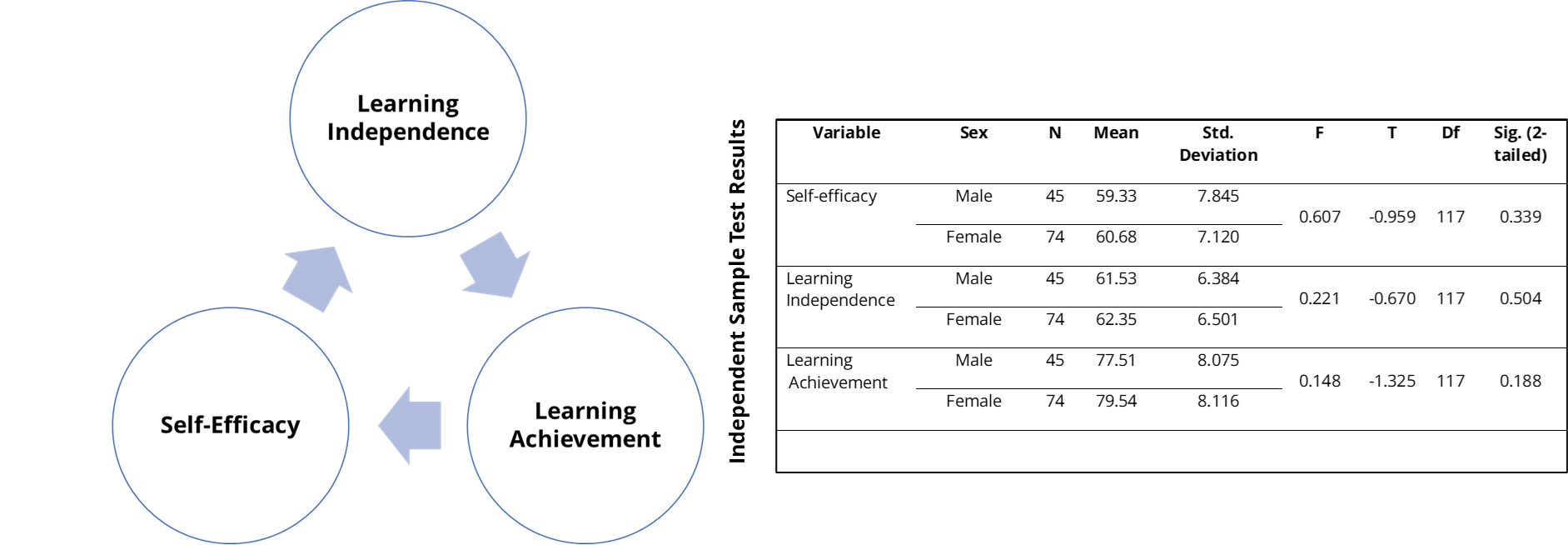Method The Influence of Self-Efficacy and Learning Independence of Students on Chemistry Learning Achievement: Case Study State of 10th Grade Senior High School in Public High School 15 Pekanbaru
DOI:
https://doi.org/10.22437/chp.v8i1.32867Keywords:
Learning Achievement,, Learning Independence, Self-EddicacyAbstract
Self-efficacy and learning independence are important factors in improving chemistry learning achievement and these factors must be mastered by students. This study aims to determine the effect of self-efficacy and learning independence on chemistry learning achievement partially or simultaneously. This type of research is a survey-research with a quantitative approach. The data collection methods for this study are questionnaires and documentation. The self-efficacy and learning independence questionnaires used were 21 questions after being validated. The questionnaires were distributed to all samples of 119 students taken using the simple random sampling technique. Documentation was used to collect data on chemistry learning achievement scores. Data analysis used in this study was multiple linear regression analysis. The results of the study showed (1) There is a positive and significant effect of self-efficacy partially on chemistry learning achievement, (2) there is a positive and significant effect of learning independence on learning achievement, (3) There is a positive and significant effect between self-efficacy and learning independence simultaneously on chemistry learning achievement.
Downloads
References
Safri, H. Ali, and K. I. Rosadi, “Literatur Review Keberhasilan Pendidikan: Berfikir Sistem, Potensi Eksternal dan Kurikulum,” J. Ekon. Manaj. Sist. Inf., vol. 3, no. 5, pp. 497–504, 2022.
S. Baro`ah, “Kebijakan Merdeka Belajar Sebagai Strategi Peningkatan Mutu Pendidikan,” J. tawadhu, vol. 4, no. 1, pp. 1063–1073, 2020.
N. Agustyaningrum and S. Suryantini, “Hubungan Kebiasaan Belajar dan Kepercayaan Diri Dengan Hasil Belajar Matematika Siswa Kelas VIII SMPN 27 Batam,” J. Ilm. Pendidik. Mat., vol. 1, no. 2, 2016.
N. Mukasari, “Upaya Meningkatkan Pemahaman Kimia Materi Hidrokarbon Melalui Model Discovey Learning Peserta Didik Kelas XI MIPA 6 SMA Negeri 2 Kuta,” J. Inov. Pendidik. Mat. dan IPA, vol. 3, no. 1, pp. 35–41, 2023.
A. Bandura, Self-Efficacy: The Exercise of Control. New York: W. H. Freeman and Company, 1997.
Minarti, “Efikasi Diri Guru (Studi di Kabupaten Sidenreng Rappang - Sulawesi Selatan),” Poros Onim J. Sos. Keagamaan, vol. 1, no. 2, pp. 121–130, 2020.
S. Nurfadilah and D. L. Hakim, “Kemandirian Belajar Siswa Dalam Proses Pembelajaran Matematika,” Pros. Sesiomadika, vol. 2, no. 1e, pp. 1214–1223, 2019.
S. Aisah, D. Kurniasih, and Fitriani, “Analisis Kemandirian Belajar Siswa Pada Mata Pelajaran Kimia di Kelas X SMA Negeri 3 Sintang,” Ar-Razi J. Ilm., vol. 6, no. 2, pp. 76–86, 2018.
W. O. C. Chairunnisa, Murtihapsari, and C. N. Larasati, “Efikasi Diri dan Kemandirian Belajar Terhadap Hasil Belajar Kognitif Peserta Didik di SMA,” J. Pendidik. Kim. Undiksha, vol. 5, no. 2, pp. 75–82, 2021.
I. Safitri, B. Yolida, and A. Surbakti, “Hubungan Self-Efficacy Berdasarkan Gender Dengan Hasil Belajar Siswa Mata Pelajaran IPA,” J. Bioterdidik, vol. 7, no. 3, 2019.
F. Fauzan, M. Fathurrohman, and Syamsuri, “Perbedaan Persepsi dan Kemandirian Belajar Siswa SMA Terhadap Pembelajaran Daring Ditinjau dari Gender,” J. Penelit. dan Pengajaran Mat., vol. 2, no. 2, pp. 136–151, 2020.
D. P. Sari, N. I. Meifiani, and Suryatin, “Pengaruh Gender terhadap Hasil Belajar Siswa Kelas V Mi Al-Huda Ploso Tahun Pelajaran 2019/2020,” STKIP PGRI Pacitan, pp. 1–7, 2020.
D. K. Pramesta and D. K. Dewi, “Hubungan Antara Efikasi Diri dengan Stres Akademik pada Siswa di SMA X,” Character J. Penelit. Psikol., vol. 8, no. 7, 2021.
S. U. Nurhasanah, “Pengaruh Efikasi Diri dan Sarana Prasarana terhadap Hasil Belajar pada Siswa SMK Negeri 44 Jakarta.,” Universitas Negeri Jakarta, 2018.
M. Widianti, M. Nursolihah, and Nasaruddin, “Pengaruh Kemandirian Belajar terhadap Prestasi Belajar Bahasa Indonesia pada Siswa Kelas XI SMA di Kota Depok Jawa Barat,” Literasi, J. Ilm. Pend. Bahasa, Sastra Indones. dan Drh., vol. 10, no. 1, pp. 42–53, 2020.
A. Wirayat, J. H. Matsum, and Okianna, “Pengaruh Kemandirian Belajar terhadap Hasil Belajar Siswa pada Mata Pelajaran Ekonomi di SMA,” J. Pendidik. dan Pembelajaran Khatulistiwa, vol. 4, no. 8, pp. 1–12, 2015.
S. Julaecha and A. Baist, “Hubungan Kemandirian Belajar dengan Hasil Belajar Siswa SMK Kelas XII pada Pelajaran Matematika,” J. Anal., vol. 5, no. 2, pp. 103–108, 2019, doi: 10.15575/ja.v5i2.4752.
S. A. Rachman, R. F. Mustofa, and D. Diella, “Hubungan Self-efficacy dan Kemandirian Belajar Terhadap Hasil Belajar Siswa Pada Materi Sel,” Bio-Edu J. Pendidik. Biol., vol. 7, no. 1, pp. 51–60, 2022.
A. Kurniawati, P. Pardjono, F. Mutohhari, S. Nurhaji, S. Purnomo. Improving Self Efficacy and Learning Motivation Through Hybrid Learning Based Google Classroom, Jurnal Pendidikan Indonesia., Vol.11, No.3, pp. 501-521, 2022.
F. Solikhin, A. Wijanarko. Profile of Students' Self-Efficacy in Using Chemdroid Media in Thermochemistry Learning, Journal of Educational Chemistry., Vol.2, No.2, pp. 135-142, 2021.






